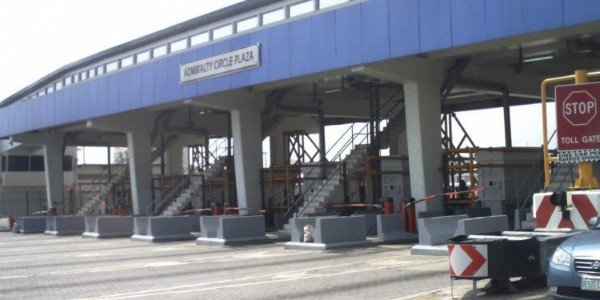Explainer: What to know about FG’s planned Tolling Policy
The Special Assistant to President Buhari on Digital and New Media, Tolu Ogunlesi, recently took to Twitter to advise Nigerians to be inured with the tolling system in the country as the federal government would reintroduce tolling on major highways once the stage is set under its Highway Development Management Initiative (HDMI). According to Ogunlesi […]

FILE PHOTO: Lekki Toll Gate, Lagos
The Special Assistant to President Buhari on Digital and New Media, Tolu Ogunlesi, recently took to Twitter to advise Nigerians to be inured with the tolling system in the country as the federal government would reintroduce tolling on major highways once the stage is set under its Highway Development Management Initiative (HDMI).
According to Ogunlesi “Nigerians should start getting used to the idea of toll gates. The new Lagos-Ibadan Expressway will have when completed. Second Niger Bridge will have. All major federal highways too, under the Highway Development Management Initiative (HDMI) Tolling Policy are already approved.
- Senate gets ultimatum to probe ‘contract scam’ in NPC
- Obi of Onitsha: A phone call stopped me from boarding attacked Abuja-Kaduna train
In the same vein, the Chief of Staff to President Muhammadu Buhari, Prof Ibrahim Gambari, during an inspection of the Second Niger bridge stated that a levy would be placed on motorists that ply it when completed.
While pointing out that the decision is backed by the Federal Executive Council (FEC), he said the new road would be an alternative route, “so, when this bridge is tolled, the old bridge is an alternative route, so you have the choice to make between speed and price.”
Why is tolling necessary
Governments across the world implement tolling plaza on roads to raise money for maintenance or recoup the cost used in constructing the road. This system according to the Organisation for Economic Co-operation and Development enables investment and faster construction of roads without straining the budget of governments, thus, espousing Public Private Partnership in road construction.
It added that the regular collection of money from commuters would also make such road to have quality as its maintenance would be regular since it is financed by the public.
A report by Wikipedia said charges of motorists could be based on timing that allows a road user access to the road at a given period of time as well as grant access to other facilities on the road.
Also, there is the motorway and other infrastructure tolling used to charge motorists on “comparatively costly infrastructure, like a bridge, a tunnel, a mountain pass, a motorway concession, or the whole motorway network of a country, and the distance or area charges where vehicles are charged per total distance driven in a defined area.”
Tolling plazas were dismantled in Nigeria in 2003 under President Obasanjo who claimed that the plazas were inefficient in catering for the purpose there were created for due to corruption.
But the present administration proposed its return when the roads to be placed are “motorable” due to paucity of funds to look after and construct roads by the federation government.
Nigeria’s Tolling Policy
Nigeria’s new Tolling Policy was approved by FEC last year and the Minister of Works and Housing, Babatunde Fashola, said the policy was developed after due consultations with various stakeholders in the transportation sector.
Fashola added that a survey was conducted to know the willingness of how Nigerians will pay. Thus, the vehicles to be charged were divide into five with their prices fixed at; cars N200, SUVs N300, private buses N300, commercial Buses N150, luxury Buses and trucks N500.
However, the policy provides for vehicle owners who live around toll plazas to benefit from frequent user discounts on the toll fares.
The minister said the pricing was an open tolling policy as against the closed tolling policy, stating that the difference is that under the open tolling policy, payment is made fixed on predetermined distance while the closed would result to payment over distance travelled and the size of vehicles.
He stressed that proceed made from the tolling would be used “to maintain roads, to construct new roads as they accrue and also to pay the investors who invest in building or completing a road and then take a concession on it. Those are the uses.”
With collection of payment to be made electronically for effective management, audit and transparency, some exemption will be made.
“We have proposed and the council has approved those certain types of vehicles be exempted for paying tolls. Those are bicycles, pedal cycles, tricycles, motorcycles, and others that have two or three-wheeled transport used mainly by disadvantaged members of our community, they will be entitled to a full 100 percent exemption, as will be diplomatic, military and paramilitary vehicles,” he stated.
Roads to be affected include the 12 roads that are considered under the HDMI and some double lane roads culminating into 14.3 from the 35,000 kilometres of federal roads to be tolled, as such 85.27 percent not yet considered.
The roads under the HDMI include; Benin-Asaba Abuja-Lokoja, Kano-Katsina Onitsha-Owerri-Aba Shagamu-Benin (258km), Abuja-Keffi-Akwanga, Kano-Shuari, Potiskum-Damaturu, Lokoja-Benin, Enugu-Port Harcourt, Ilorin-Jebba, Lagos-Otta-Abeokuta, and Lagos-Badagry-Seme.
